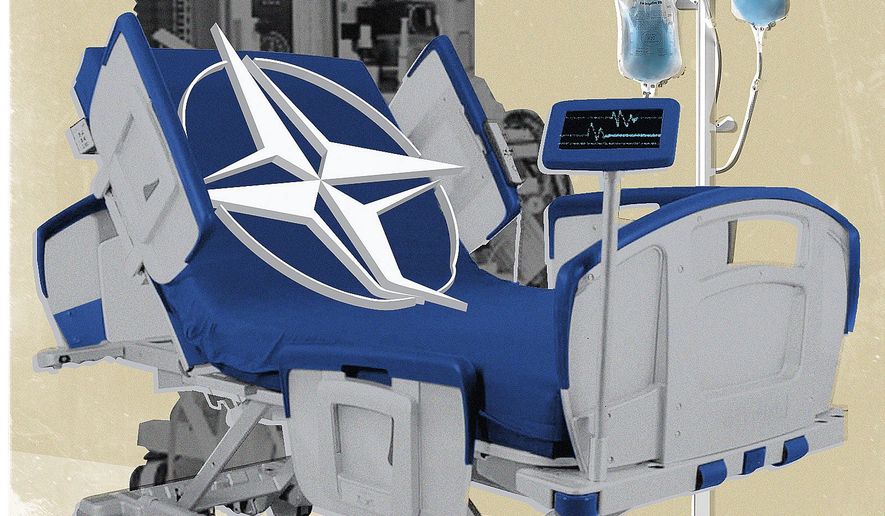OPINION:
April 4 will be the 70th anniversary of the signing of the NATO Treaty. If success is measured in terms avoiding nuclear war, the 12 original NATO members created one of the most successful military alliances in history.
Before he took the job as NATO’s first secretary general, Britain’s Lord Ismay, said that NATO’s purpose was to keep the Soviet Union out, the Americans in, and the Germans down.
That boiled down to America’s guarantee that we would go to war against the Soviet Union if it attacked Western Europe. But the Soviet Union no longer exists. Germany is standing atop Europe’s biggest economy and the Americans are still in, protecting NATO members that aren’t interested in protecting themselves.
NATO has grown to include 29 nations, including Germany, Turkey and essentially the whole of the European Union. Some new members such as the tiny nation of Montenegro cannot contribute significantly to the central promise upon which NATO is based: Article 5 of the treaty in which every member promises that an attack on one shall be regarded as an attack on all.
Most importantly, the alliance is fraying because its members no longer pursue common goals and are unwilling to contribute to their own defense. The agreed-upon level of defense spending — 2 percent of each nation’s gross domestic product — is spent by only five of the 29 members: the United States, the U.K., Poland, Estonia and Greece. Regardless, President Trump’s strong criticisms of them, most NATO leaders are simply unwilling to share the burden of defense.
On March 19, German Chancellor Angela Merkel rejected U.S. criticism of German defense spending and indicated that its current defense spending — 1.2 percent of GDP — may shrink next year.
There are many other serious problems caused by the actions of several NATO members. Can NATO survive the failings of its members much longer?
A better question is, should it survive in its current form? That answer is clearly no.
Russia, under President Vladimir Putin, is an aggressor that needs to be contained and deterred. But Germany — and other NATO members — don’t agree that it is. The Nordtstream One pipeline brings Russian natural gas to Europe, making Europe in general and Germany in particular dependent on Russian goodwill. Soon the Nordstream Two pipeline will increase that dependency.
None of the NATO countries supported Mr. Trump’s exit from the highly dangerous nuclear weapons deal with Iran that former President Obama crafted. Worse still, several of them have helped Iran create a banking mechanism which enables Iran to evade U.S. sanctions.
In just the past weeks, Italy has agreed to join China’s “Belt and Road Initiative” through which the Chinese are lending nations great sums of money to build infrastructure to connect with China. But the BRI is also a means by which China is making nations into debtors, a trap that gives them leverage over the borrower nations’ policies.
Prime Minister Giuseppe Conte was warned by Italy’s Parliamentary Committee for the Intelligence and Security Services that joining BRI will affect Italy’s national security. Mr. Conte went ahead with the deal despite that warning and similar warnings from U.S. officials.
Under its President Recep Erdogan, Turkey has become an adversary instead of an ally. Mr. Erdogan has turned secular Turkey into an Islamist state. He has allied Turkey with Russia and Iran to keep the terrorist dictatorship of Syria’s Bashar Assad in power. He has also purchased the Russian S-400 anti-aircraft/anti-missile system (to be delivered this summer) which is incompatible with — and threatens — NATO defenses.
The only time the mutual defense provision of the NATO Treaty was invoked was after the Sept. 11, 2001, attacks on the United States. Several NATO nations sent troops to join ours in Afghanistan and Iraq. Some are still in Afghanistan. But if you leave out the United States, the military forces of NATO’s members — separately or collectively — are unable to perform any significant mission.
For example, in 2011, when France wanted to lead a NATO campaign to topple Libya’s Moammar Gadhafi, it quickly found that the NATO powers couldn’t do it without U.S. air power. Since then, the NATO members’ defense capabilities have only decreased.
America still shields NATO’s members from attacks, but our adversaries have gained considerable power over many members without attacking them. China, Russia and Iran have gained such power through economic means and by seducing, as has Iran, the NATO powers to suborn American sanctions.
Turkey should be expelled from NATO, the flow of Russian gas through the Nordstream pipelines should be terminated, NATO members should stand together against Iran and Italy should cancel its BRI agreement with China. But none of those things will happen.
NATO should be reformed but to do so would require major changes to the 1949 Treaty which, if attempted, could destroy the alliance. Were they even suggested, in terms requiring better adherence to common goals and defense spending by members, the politics of nations such as the U.K., France and Germany would turn quickly against any reforms. The only thing that can save NATO is the most unlikely: That the current governments of its members are replaced with more responsible actors.
Without adherence to common goals NATO cannot be a military alliance. Our adversaries understand that better than our allies do.
• Jed Babbin, a deputy undersecretary of Defense in the George H.W. Bush administration, is the author of “In the Words of Our Enemies.”




Please read our comment policy before commenting.